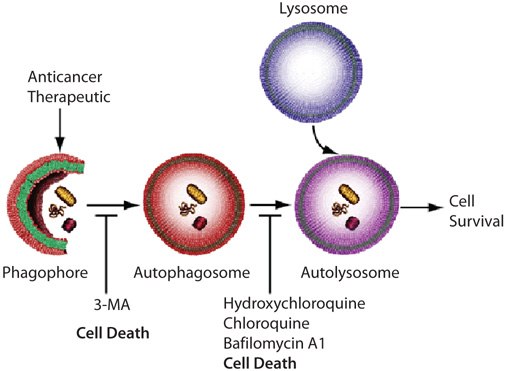Autophagy in Cancer Promotes Therapeutic Resistance
Autophagy is a highly regulated process by which long-lived proteins, organelles, and protein aggregates are captured within autophagosomes, which are then fused with lysosomes for degradation.1 Autophagy is often induced during metabolic stress or other adverse conditions as the degradation products can be funneled into biosynthetic pathways or used for ATP production, allowing for cellular survival by self-cannabilization.2 While required for normal homeostasis, autophagy can contribute to the development of many pathological processes, including cancer. The deregulation of autophagy occurs in multiple types of cancer and current research suggests a complex and cellular context-specific role for this process during oncogenic transformation. In general, autophagy seems to be tumor suppressive in normal cells and during early oncogenic transformation but may act as a critical survival pathway for established tumors.3-5
Developing and established tumors are subjected to multiple autophagy-inducing stressors, including hypoxia, low nutrient conditions, and high metabolic demands due to increased proliferation. In non-transformed cells, the effect of these stressors typically results in apoptosis or necrosis. As many cancer cells have high apoptotic thresholds, the induction of autophagy serves as a survival mechanism in many tumor cells, allowing them to escape apoptotic or necrotic death in response to metabolic crisis. The high metabolic demands of many cancer cells due to rapid proliferation may render them heavily dependent on autophagy to supply biosynthetic metabolites.6 As many cancer therapeutics are designed to chemically mimic nutrient deprivation and starvation, it is not surprising that autophagy is often upregulated in response to treatment. This increased upreglation is often associated with therapeutic resistance and may be one method these cells use to escape death.2,3,6
The heavy reliance of many cancer cells on autophagy for survival suggests inhibiting autophagy in these cells may be a viable therapeutic target. Treatment of cells that have acquired therapeutic resistance with autophagy inhibitors shows particular promise in many preliminary studies. For example, treatment of ER-positive breast cancer cells with the selective estrogen response modifier Tamoxifen typically results in the development of resistance in up to 30% of patients.7 In a recent study, treatment of breast cancer lines with the active tamoxifen metabolite, 4-hydroxytamoxifen (4-OHT), resulted in the upregulation of autophagy in surviving cells while the dual treatment of these cells with autophagy inhibitors and 4-OHT resulted in apoptotic death.8 Preliminary evidence in colon cancer xenograft studies suggest the combination of bortezomib and chloroquine, a late-stage autophagy inhibitor, demonstrated greater efficacy in regards to inhibition of tumor growth than treatment with either drug alone. In particular, the autophagy inhibitors chloroquine and hydroxychloroquine, commonly used antimalarial drugs, are currently being investigated in phase I and phase II trials in patients with glioblastoma and myeloma.6 In other studies, treatment of various cancer cells with small-molecule autophagy inhibitors, such as 3-methyladenine, bafilomycin A, chloroquine, and hydroxychloroquine, sensitized these cells to multiple forms of treatment resulting in apoptosis.3,6 Deciphering the role of autophagy in tumor survival will allow for the development of more specific inhibitors and better treatment regimens.

Materials
References
如要继续阅读,请登录或创建帐户。
暂无帐户?